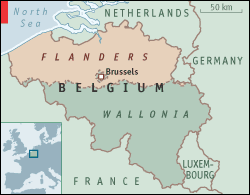
For football supporters the world round, Jean-Marie Pfaff is best known as a tremendously curly haired Belgian goalkeeper, at his best in the mid 1980s when the national team was at the peak of its powers. Most would probably presume that since retiring from the game he has gone on to calmly wile away his days as a goalkeeping coach or a cafe owner and hopefully, while he was at it, had a haircut.
Jean-Marie has, however, refused to go gently into that dark night of retirement. His hair style has altered not one iota and in Belgium, or in Flanders at least, he is inescapable. Every Monday evening the nation can tune in to the latest episode of 'the Pfaffs' reality tv show to find out what Jean-Marie and his offspring, their partners, and children have been up to over the past week.
This week for example, one of his daughters held a 'baby shower' at which nothing much happened except for a bit of a downpour. Another daughter fell over while attempting to iceskate. Yet another daughter visited the doctor to assess the likelihood of her giving birth within the next two weeks. One can only presume that the producers are desperate for something slightly momentous to happen.
Quite why any of this is deserving of academic analysis is a good question, yet that is exactly what Alexander Dhoest subjects it to in his essay 'The Pfaffs are not like the Osbournes: national inflections of the celebrity docusoap.' Dhoest argues that while both shows are 'superficially similar, they also show many differences, which are partly related to their respective national contexts. Although eccentric, The Osbournes is typically American in several respects, referring to American myths and themes. The Pfaffs, in contrast, are presented as typically Flemish, most clearly through the emphasis on their simplicity and ordinariness.'
Well I'm sorry to blow Mr. Dhoest's arguments out of the water but there are some important similarities. For a start both shows make absolutely excruciating viewing. Secondly, both Jean-Marie and Ozzy have daughters called Kelly. Thirdly, and most importantly, both men would probably sell aforementioned progeny if it would make them a quid or two. Jean-Marie is well known for the prominent sponsorship on his shirt collars.
But back to yesterday's show, and the point. Pfaff had been invited back to Germany to attend the Beer Festival. I say 'back' to Germany because in the 80s he stood between the sticks for none other than Bayern Munich. And it was here, after one of his first matches for Bayern, that he made the contribution that will outlast any cameras up the nose episode of reality tv in the folk memory. It was here that, having saved a crucial penalty, he attempted to speak German.
This video link may not be that funny for many outside Germany or Belgium (could that be the definition of 'not funny at all'?) but it captures exactly what most Flemish people do when they try to speak German. Speak Dutch but weirdly. Take it away Jean-Marie....
http://www.youtube.com/watch?v=NDf0p4MgFmw&search=pfaff
 Call it vegetable solidarity if you like, but the Witloof would like to mark the passing of Brussels' foremost printed satirical publication, the Sprout. For 36 issues, stretching over three years, the Sprout has provided the European Union with that which any healthy democracy requires, a good solid satirical spanking.
Call it vegetable solidarity if you like, but the Witloof would like to mark the passing of Brussels' foremost printed satirical publication, the Sprout. For 36 issues, stretching over three years, the Sprout has provided the European Union with that which any healthy democracy requires, a good solid satirical spanking.

